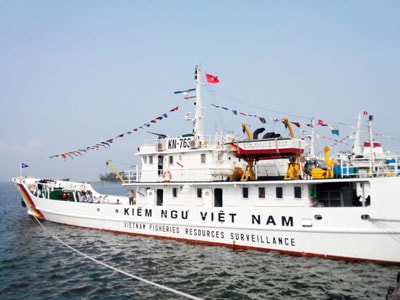Legal status of vehicles operating in maritime zones
(Baonghean.vn) -Question 19. Legal status of means of transport operating in maritime zones: warships and other state vessels used for non-commercial purposes?
Reply:Means of transport operating in sea areas and continental shelves are subject to the Law of the Sea. Warships and state vessels used for non-commercial purposes are among the subjects of the Law of the Sea.
 |
| Vietnamese fisheries surveillance ship. Illustrative photo |
According to the Hague Convention of 1907 and the UN Convention on the Law of the Sea of 1982, a warship is a ship belonging to the armed forces of a country and bearing the external marks characteristic of a military ship of that country's nationality, commanded by a naval officer serving that country, whose name is on the list of officers or in equivalent documents, and the crew must comply with military orders and discipline. The Hague Convention of 1907 allows military ships to be disguised in war on the condition that they do not engage in combat when encountering ships of a neutral country and when entering battle, if they are using a flag for disguise, they must lower the disguise flag and raise their own flag. Disguise of military ships is not allowed to be applied in peacetime.
Warships and government vessels used for non-commercial purposes enjoy complete immunity when they are operating lawfully on the seas. The host State may only expel the vessel if it considers that the vessel has violated its sovereignty and request the Government of the military vessel to punish the offenders through diplomatic channels.
However, this immunity is not unlimited, and along with those rights there are also obligations that military vessels must perform when operating in different sea areas.
For example, when operating at sea, warships are entitled to search all other vessels when there is a solid basis to believe that these vessels have committed acts of piracy, illegal trafficking, transporting slaves, drugs, toxic substances, are transmitting information in violation of international regulations, are stateless vessels, have or do not fly flags but in fact have the same nationality as the military vessel performing the search. Conversely, if it is not proven that the vessel being searched has committed one of the above-mentioned crimes, the vessel conducting the search must compensate for the damage caused by the search.
In the exclusive economic zone, warships also have the same rights and obligations as in the high seas. Warships of the host country also have the right to search and arrest foreign vessels operating in violation of the regulations of their country. In the contiguous zone, warships of the host country, in addition to the rights and obligations mentioned in the high seas and exclusive economic zone, also have the duty to coordinate with other specialized agencies to prevent and punish all violations of customs, financial, immigration, sanitary and health regulations of their country.
Warships shall comply with the laws and regulations of the coastal State relating to innocent passage of warships through the territorial sea. If a warship, while conducting innocent passage through the territorial sea of a coastal State, disregards the laws and regulations to which it has been notified, the coastal State may require the warship to leave the territorial sea immediately.
The flag State shall bear international responsibility for any loss or damage to the coastal State resulting from any violation by a warship or any other government ship operated for non-commercial purposes of the laws and regulations of the coastal State concerning passage through the territorial sea or of the provisions of this Convention or other rules of international law.
According to Q&A on Vietnam's Law of the Sea
(To be continued)






